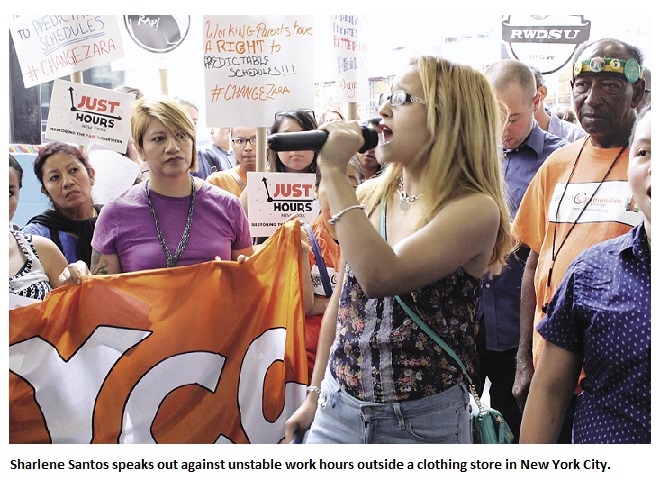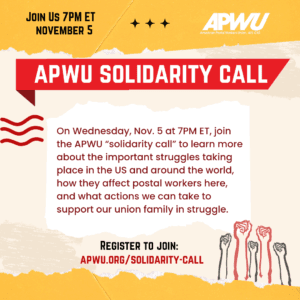December 23, 2014
Unstable Hours Are Killing Workers
 This article appeared in the January-February 2015 issue of The American Postal Worker magazine.
This article appeared in the January-February 2015 issue of The American Postal Worker magazine.
On Aug. 25, 2014, Maria Fernandes was found dead inside her automobile. The 32-year old worked at three different Dunkin Donuts stores in New Jersey and frequently napped in her car between shifts. She also carried a gasoline container in the backseat, so she wouldn’t risk running out of gas while driving from store to store.
Unfortunately, the habits she developed to keep up with her hectic work schedule cost Fernandes her life. After getting off of work at 6 a.m., she parked her car to rest before her next shift.
But Fernandes never made it to the next shop. According to police reports, she was overcome by toxic fumes from the overturned gas container.
In July, the New York Times wrote about the struggles of a Starbucks barista in San Diego with unpredictable work hours who is trying to raise a young son. Hundreds of readers commented on the article, saying they faced similar problems. After the outcry, Starbucks promised to change its scheduling practices.
Short Shifted
Sharlene Santos has been fighting erratic work hours at Zara, a clothing store in New York City. “Imagine how crazy your life would be if you only knew your hours two days in advance,” she said at a rally outside the store last summer.
“We want predictable and regular schedules, job security, yearly raises,” she said. Santos is a member of the Retail Action Project (RAP), which has been fighting for “just hours” for several years.
Increasingly, workers are assigned short shifts, last-minute shifts, or no shifts, as computer software programs create schedules based on companies’ past patterns or deliveries, according to a study RAP performed.
Many workers are fighting to take their work schedules – and their lives – into their own hands. “There’s now an emerging national movement around fair work schedules,” said Gordon Mar of the San Francisco Jobs with Justice.
Making Progress
In November, the San Francisco Board of Supervisors adopted a Retail Workers Bill of Rights, which requires store and restaurant owners to offer part-time employees more hours before hiring additional part-timers; inform workers of their schedules at least two weeks in advance, and give them two to four hours pay if an “on-call” shift is canceled with less than 24 hours notice.
“This is an incredible victory for people in our city who are scraping by paycheck-to-paycheck and hour-to-hour,” Mar said. “San Francisco is on its way to ensuring more men and women in our community have schedules and hours that allow them pay their bills, plan their lives, and take care of their loved ones.”
On Nov. 18, workers and their families took to Twitter to advance the demand for stable hours. Across the country, people tweeted pictures of themselves holding signs explaining why workers need #SchedulesThatWork.



